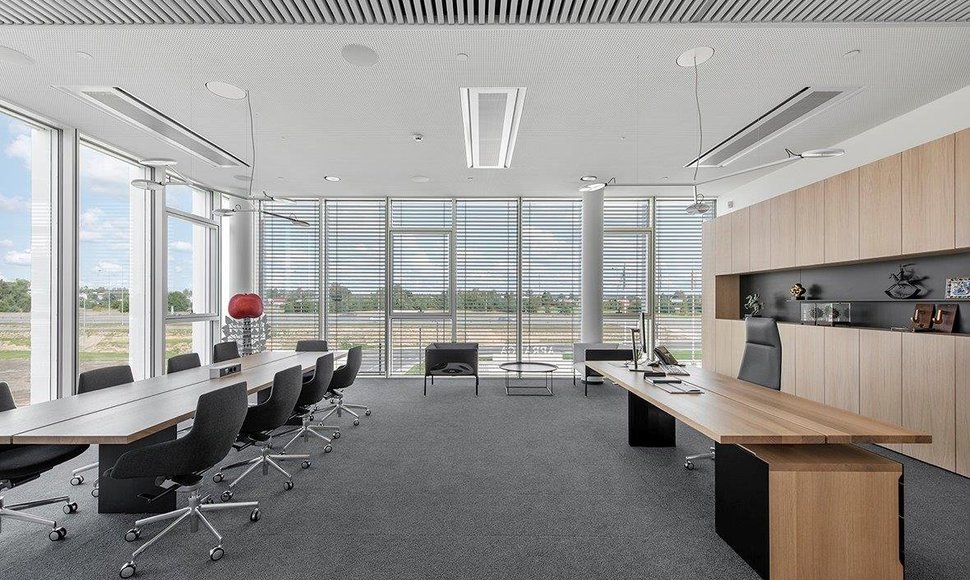Mantas Mikalauskas, an analyst for Darnu Group, one of the country’s largest residential, business and resting space creating companies, notes that none of the tenants in the business centres managed and administered by the company, which span a combined 60,000 square-metres of rented out space, are planning to reduce their office space due to increased interest among staff to work from home. However, extended practice among staff to work from home has spurred on certain changes, the importance of which emerged with summer concluding.
“We are closely monitoring the moods of office staff not only in our business centres but also further afield – we are also analysing the situation in countries which recovered before Lithuania following their lockdowns. It is clear that the office market is due to face transformations, some of them already being underway,” the analyst says.
More effective use of workspaces
According to Marijus Cilcius, the head of MV Group which unites over a thousand employees, in the context of the pandemic, the demand to individually organise the operation of separate companies and sections of the group has gained particular prominence. He notes that such solutions have proved justified and have allowed for uninterrupted operations while ensuring maximum safety for the staff.
M. Cilcius explains that the part of the team, which worked remotely from the very first to the last day of lockdown, is gradually returning to working in the office. The first to return are the staff members for whom it is more convenient to perform their work functions at the office, while the rest have split up into teams.
“Up to now, the staff worked in rotation. One group in the office for one week, another group during another. This way, we reduce the flow of people and the likelihood of infection. As a socially responsible employer, we will continue to do our all to protect our staff,” M. Cilcius emphasises.
According to Mr. Mikalauskas, a similar path of organising mixed work when part of the staff can work at the office and remotely at different times, has been chosen by most employers who want to find mutually acceptable compromises for all their staff members. The Ministry of Healthcare also indicates this approach to work as recommended.
“Worldwide trends show that due to the epidemiological situation, workplace density should be reduced, but their utilisation could potentially increase. For this, flexible workspaces are created, between which staff can migrate. The utilisation of these workspaces should potentially exceed the utilisation of a typical workspace,” the analyst notes.
According to Mr. Mikalauskas, this is convenient not only in seeking greater workplace efficiency but also in project work when team members of a given project can migrate.
“Other changes will emerge as well – offices will become a coworking and teamwork location and so, more common spaces will be formed where staff will be able to comfortably perform their team’s tasks,” the specialist says.
Demand for Class A premises
Mr. Mikalauskas says that the capital is currently experiencing demand for the highest quality and most technologically advanced Class A premises, with somewhat smaller demand tension in the B segment. According to Mikalauskas, technological innovations, the flexibility of the premises offered by developers and a more liberal attitude from employers to organising work will be the key trends of the office market in the future.
The specialist notes that in the contemporary market, tenants are particularly concerned with flexibility.
“The uncertainty of the situation has shown that it is difficult to plan the need for space and the development of business for the coming five years. As such, we are already observing among tenants a desire for office space and contract flexibility,” Mr. Mikalauskas says.
He also points out that numerous office workers who have had a taste of working from home were glad to return to more usual conditions. Employers were only left to resolve the main question of how to ensure a safe environment.
M. Cilcius believes that this news should come as no surprise because people are all different. Some prefer working remotely, others might want to work from home, but do not have the necessary conditions and so, returned to the offices.
“Others yet value the usual work environment, the regime, the live interaction with colleagues and so prefer working at the office. We take a flexible view, offering conditions to coordinate both forms of work. Furthermore, in our case, it so coincided that during the lockdown, we moved to a new office in the Paupys area. As the premises are all new, solutions relevant to the pandemic context are already implemented in them: modern ventilation system, barriers to separate workspaces. We obtained further supplies of disinfectants and gloves,” M. Cilcius reveals.
Hard to separate work and rest while working from home
According to psychotherapist Ugnė Juodytė, some people were impatiently waiting for the opportunity to return to work in the offices and are watching the daily COVID-19 infection numbers with concern. The main reasons for such behaviours are, according to the specialist, the lack of calm and teamwork in the home environment, as well as the separation between work and rest all but disappearing.
“In order to work effectively, it is important to have a calm space, but it is not always available at home,” U. Juodytė states.
The psychologist also reveals that staff faced difficulty during the lockdown in separating work and rest, they were simply unable to finish work at their usual time and step away.
“While at the start, the results are appealing because the amount of work performed increases, but eventually, burnout, exhaustion and apathy set in,” the specialist says.
Juodytė also highlights that a defined workspace improves effectiveness because everything is adapted for work. This offers people a sense of security and working in a constant environment helps save much energy, and generates less stress.













